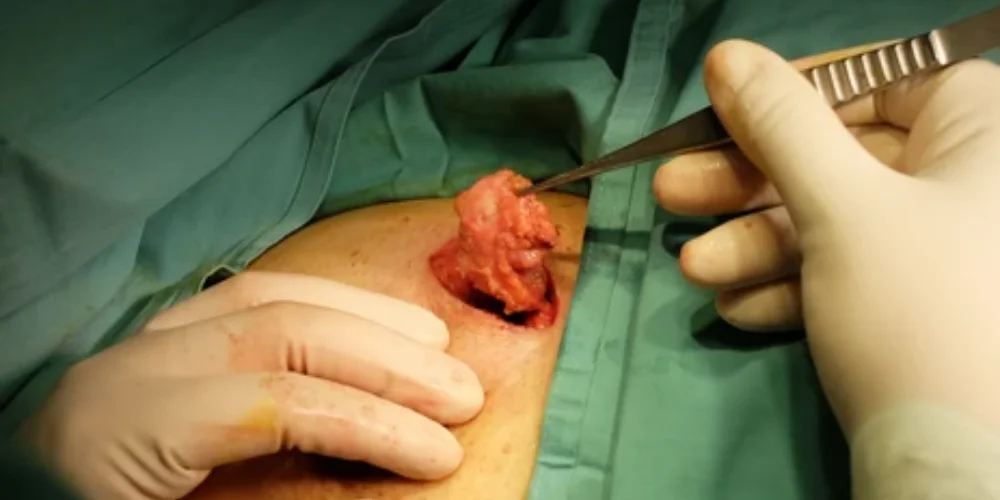Lumpectomy Surgery
Preserving Health and Confidence with Targeted Cancer Treatment
A lumpectomy, often referred to as breast-conserving surgery is an extremely effective option for patients who are diagnosed with early-stage breast cancer. Contrary to a mastectomy which requires the removal of whole breasts, lumpectomy is focused on the removal of the cancerous tumor as well as some of the surrounding tissue. This method lets patients keep the majority of their breasts, allowing an ideal balance between treatment for cancer and aesthetic results. In Chirayu Super Speciality Hospital, we blend advanced surgical techniques and a patient-centered approach to provide the most effective results to your health and well-being.

What is Lumpectomy Surgery?
Lumpectomy surgery involves the elimination of the cancerous breast (lump) as well as the surrounding healthy tissue. The purpose of this procedure is to remove the cancer while keeping the breast as much as is possible. It is typically preceded by radiotherapy that targets the remaining cancerous cells, which reduces the chance of getting them back. Lumpectomy is a great treatment option for women with smaller, localized tumors. It is regarded as equally beneficial as mastectomy when treating early stage breast cancer.
Who Performs Your Surgery?
The lumpectomy procedure in Chirayu Super Speciality Hospital is performed by a team of highly skilled breast surgeons, who specialize in breast-preserving procedures. The surgeons collaborate closely with radiologists, oncologists, and pathologists to create an individual treatment plan that is tailored to your particular diagnosis and preferences, which ensures an integrated approach to your treatment.
Indications for Lumpectomy Surgery
- Early-stage Breast Cancer : Patients diagnosed with Stage I or II breast cancer in which it is small in size and has a localization.
- Ductal Carcinoma in Situ (DCIS) : Non-invasive cancer that is restricted to the ducts in the breast.
- Benign Tumors : The removal of benign lumps that are not cancerous, including the fibroadenomas for diagnostic or aesthetic reasons.
- Patients Preferences : Women who would prefer to preserve their breast tissue, rather than undergo an operation called a mastectomy.
Types of Lumpectomy Surgery
- Traditional Lumpectomy : The removal of tumor as well as the surrounding tissue, usually followed by radiation treatment.
- Oncoplastic Lumpectomy : Combines surgery for cancer with plastic surgery techniques to shape the breast after removal of tumors to improve cosmetic results.
- Wire-Guided Lumpectomy : A wire of a thin length is inserted inside the breasts to direct the surgeon to the exact site of the tumor. This is typically used to treat non-palpable tumors.
- Sentinel Lymph Node Biopsy : Sometimes, in conjunction by lumpectomy. This treatment is the elimination of a couple of important lymph nodes in order to look for the possibility of spreading cancer.
Symptoms Indicating the Need for Surgery
- A visible lump or mass within the breast.
- Changes in the shape or size of breasts.
- Mammogram abnormalities as well as other imaging of breasts.
- A persistent breast pain or discomfort in a particular area.
- Nipple discharge or inversion.
Diagnosis Leading to Lumpectomy
A lumpectomy is usually advised following the diagnosis of breast cancer is confirmed through imaging tests (mammogram ultrasound, mammogram, MRI) as well as a biopsy. The surgical team will examine the size, location and features of the tumor as well as the overall health of the patient and determine whether a lumpectomy is the best treatment alternative.
Treatment Process
The procedure of lumpectomy is generally carried out with general anesthesia. In the course of the procedure, the surgeon removes the tumor with a tiny area of tissue that is healthy to guarantee free margins. If needed an invasive sentinel lymphoma biopsy could be performed to assess the growth of cancer. The procedure is typically about 1 to 2 hours and patients can leave the hospital on the same day. After surgery, patients are often treated with radiation therapy to decrease the chance of recurrence from cancer.
Care and Recovery After Surgery
The recovery after a lumpectomy is generally faster than after the mastectomy, with most patients returning to their normal activities in less than about a week. A few instances of discomfort, swelling and bruises around the surgical area are typical, but they can be cured by prescribed medications. The patients are urged to adhere to the instructions of their surgeon regarding treatment of the wound, physical exercise and to attend regular follow-up appointments to check on healing and discuss additional treatment like radiation therapy.
Advantages of Choosing Our Surgery Services
Breast Conserving Approach
Our focus is on treating cancer while preserving as much of the breast as possible, balancing health with cosmetic outcomes.
Multidisciplinary Care
Our team of specialists collaborates to create a personalized treatment plan that addresses all aspects of your cancer care.
Advanced Surgical Techniques
We employ cutting-edge techniques like oncoplastic surgery to enhance the aesthetic results of your lumpectomy.
What Our Patients Say
Read about our patients positive experiences and how Chirayu Super Speciality Hospital has positively impacted their health and well-being.


Choosing a lumpectomy at Chirayu was the best decision for my health. The surgery was precise, and the care was top-notch.


I recovered quickly from my lumpectomy, thanks to the excellent care I received. The entire team was compassionate and professional.


The expert team at Chirayu guided me through every step of my lumpectomy. The results exceeded my expectations.


My lumpectomy at Chirayu was a success. I’m grateful for the care that allowed me to keep my breast and feel whole.
Meet Our Medical Specialists
"Our specialized surgeons excel in lumpectomy procedures, offering advanced, breast-conserving surgery with a focus on patient-centered cancer care. "
Frequently Asked Questions
Here, we provide answers to some of the most commonly asked questions to help you better understand about our surgery services. If you have any additional questions, please do not hesitate to contact us.
Patients with early-stage breast cancer, small tumors, or certain benign conditions are often candidates for lumpectomy.
Lumpectomy preserves more of the breast tissue, while mastectomy involves removing the entire breast. Both have similar long-term survival rates for early-stage breast cancer.
A lumpectomy is a breast-conserving surgery that removes a tumor and a small margin of surrounding tissue, preserving most of the breast.
Risks include infection, changes in breast shape or appearance, and the possibility of needing additional surgery if clear margins are not achieved.



